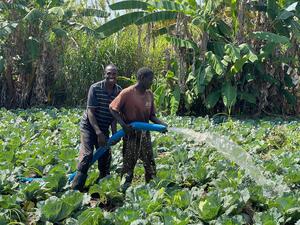Tanzania naturalises first group of 1972 Burundian refugees
Tanzania naturalises first group of 1972 Burundian refugees
This week the Tanzanian government granted citizenship to 3568 of some 162,000 Burundians who applied for citizenship after living over three decades as refugees in Tanzanian settlements. The decision marks a major milestone in a programme that will bring to a close one of the world's most protracted refugee situations. It also represents the first time that any country in Africa has naturalised refugees on such a scale.
In early 2008, the Tanzanian government gave a choice to some 218,000 Burundians who had fled violence in their country in 1972 either to return home or to apply for Tanzanian citizenship. Building on this momentum, UNHCR advocated on behalf of the refugees with the governments of Tanzania and Burundi, facilitated the decision making and provided tangible assistance both to those who decided to go and those who opted to stay.
Some 162,000 of the original case load decided to stay and applied for naturalisation.
The final breakthrough came on 4 August when the Tanzanian Minister of Home Affairs granted citizenship to the first group of applicants. Out of 3,570 individuals, only two were rejected. At the same time, the Tanzanian government reaffirmed its commitment to finalise the processing of the remaining population before the end of the year.
In the meantime, 45,000 Burundians who decided to return to Burundi are already home thanks to logistical and other forms of assistance from UNHCR. Another 9,000 will return in the coming months. The entire solutions program is funded by the international community through UNHCR's 2008-2009 Supplementary Appeal, launched in February 2008. Out of a US$28.2 million budget for 2009, US$8 million is still needed to bring the voluntary repatriation, naturalisation and initial integration to conclusion.
UNHCR will continue to support the Tanzanian government in the transition phases of the integration of the newly naturalised. Community projects including rehabilitation of roads, construction and repair of schools, building of water points, improvement of health services and upgrading of local airstrip are already under way in Rukwa and Tabora regions which hosted 1972 Burundian refugees for decades. UNHCR support to local integration is envisaged to continue until the end of 2011.
At the peak of the Burundian crisis in the 90s, nearly half a million people fled violence in their country and found shelter in camps in the Tanzanian border regions of Kigoma and Kagera. Today, the Burundian peace process has paved the way for the return of one of Africa's longest staying refugee populations. Since 2002, more than 400,000 of these refugees returned from Tanzania to Burundi.








